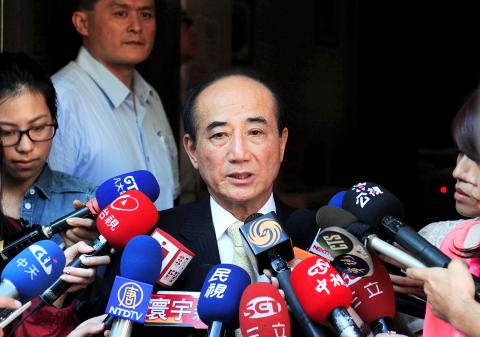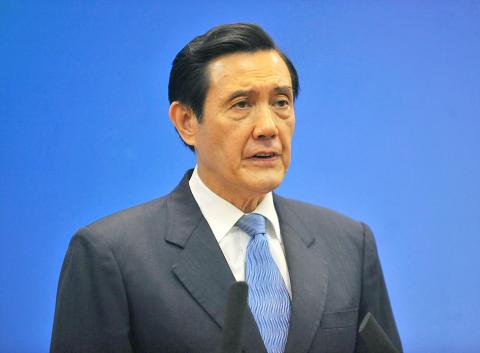At the request of President Ma Ying-jeou (馬英九), the Chinese Nationalist Party (KMT) yesterday revoked Legislative Speaker Wang Jin-pyng’s (王金平) party membership, a move that could strip him of the position he has occupied since 1999, the longest in the nation’s history.
If Wang, a KMT legislator-at-large, fails to reverse the decision through appeals to the party leadership or through other judicial means, his status as a lawmaker will be nullified and he will lose his post as speaker.
The decision was reached by a meeting of the KMT’s Central Evaluation and Discipline Committee.

Photo: CNA
Before the meeting began, Ma delivered a harshly worded statement to the media at 8:30am saying that the influence-peddling case in which Wang is allegedly involved “disqualified” him from being the legislative speaker.
It was the second strongly worded statement about Wang that the president has made since the Supreme Prosecutors’ Office Special Investigation Division (SID) on Friday last week accused Wang of meddling in a breach of trust lawsuit on behalf of Democratic Progressive Party caucus whip Ker Chien-ming (柯建銘) by urging two high-ranking judicial officials to influence a prosecutor into refraining from appealing Ker’s not-guilty verdict.
Huang Chao-yuan (黃昭元), head of the disciplinary committee, said the decision was made after more than two hours of discussion in which it was concluded that Wang “has seriously damaged the party’s image and reputation.”

Photo: Mandy Cheng / AFP
The 15-seat committee was composed of Huang, deputy committee head John Shen (沈榮峰) and 13 other members whose identities were not made public. Four members were absent for various reasons.
Ma, who heads the KMT as chairman, arrived at the party’s headquarters early in the morning and stayed in his office until the committee handed down the ruling at about 11:30am, apparently to see if it would oblige his request that Wang be removed from the party.
As a result, Ma’s 10:15am meeting at the Presidential Office with El Salvadoran Parliament Speaker Sigfrido Reyes was canceled and Reyes was received by Vice President Wu Den-yih (吳敦義) instead.
At the 8:30am press conference, Ma said he has refrained from saying that Wang should resign on his own accord since the SID disclosed the case.
“What I had hoped was that Wang would voluntarily offer to resign as legislative speaker and as KMT legislator-at-large to preserve some dignity for the legislature and the KMT,” Ma said.
Now that Wang has failed to offer to resign, the responsibility to deprive him of his office lay with the KMT, the president said.
“Doing otherwise would be tantamount to acquiescing to judicial dignity being trampled upon,” Ma said.
He again criticized Wang for his “evasiveness” about the “fact” that he “has engaged in influence peddling in Ker’s [case].”
The “hard facts” of Wang’s involvement are obvious, but Wang “didn’t even apologize” for his misconduct, Ma said.
Addressing a meeting of the KMT’s Central Standing Committee in the afternoon, the president applauded the disciplinary committee for making the “right” decision, although it was a “painful” one.
He added that Wang had contributed significantly to the party over the years, “but the [influence-peddling] incident was a chance for the party to wipe away [our] past mistakes and engage in reform, which is the only way to move the party forward and to promote party unity.”
KMT officials who declined to be named said the legislative speaker attended the meeting for just five minutes and told the disciplinary committee that he had neither interfered with a judicial process nor violated the party’s regulations.
After Wang left, Ma was invited to give his position on the matter, a KMT official said, adding that the president had teared up as he talked about his feelings on Wang’s alleged misconduct.
During the discussion, concerns were raised that the membership revocation would be a disadvantage when soliciting votes in southern Taiwan and one attendee questioned Wang’s loyalty to the party, a KMT official said.
A member of the disciplinary committee said he wondered why Wang had reportedly tried to help Ker, but not other party members involved in lawsuits, like Taipei City Councilor Lai Su-ju (賴素如), former Executive Yuan secretary-general Lin Yi-shih (林益世) and Keelung Mayor Chang Tong-rong (張通榮).
Later yesterday, Central Election Commission Vice Chairman Liu I-chou (劉義周) confirmed that the commission had received a message from KMT headquarters voiding Wang’s membership in the afternoon, adding that it forwarded the notice to the Legislative Yuan.
“We received the notice in the afternoon and have forwarded it to the Legislative Yuan,” Liu told the Taipei Times in a telephone interview.
“The Legislative Yuan will now remove Wang as a legislator and notify us in writing once they void his status as a legislator,” Liu said.
“Upon receiving confirmation from the Legislative Yuan, we will formally announce the name of the person who will take over Wang’s seat,” Liu added.
Liu added that, according to the law, Wang would lose his status as a legislator the same day his party membership is rescinded.
Additional reporting by Loa Iok-sin

Intelligence agents have recorded 510,000 instances of “controversial information” being spread online by the Chinese Communist Party (CCP) so far this year, the National Security Bureau (NSB) said in a report yesterday, as it warned of artificial intelligence (AI) being employed to generate destabilizing misinformation. The bureau submitted a written report to the Legislative Yuan in preparation for National Security Bureau Director-General Tsai Ming-yen’s (蔡明彥) appearance before the Foreign Affairs and National Defense Committee today. The CCP has been using cognitive warfare to divide Taiwanese society by commenting on controversial issues such as Taiwan Semiconductor Manufacturing Co’s (TSMC, 台積電) investments in the

INVESTIGATION: The case is the latest instance of a DPP figure being implicated in an espionage network accused of allegedly leaking information to Chinese intelligence Democratic Progressive Party (DPP) member Ho Jen-chieh (何仁傑) was detained and held incommunicado yesterday on suspicion of spying for China during his tenure as assistant to then-minister of foreign affairs Joseph Wu (吳釗燮). The Taipei District Prosecutors’ Office said Ho was implicated during its investigation into alleged spying activities by former Presidential Office consultant Wu Shang-yu (吳尚雨). Prosecutors said there is reason to believe Ho breached the National Security Act (國家安全法) by leaking classified Ministry of Foreign Affairs information to Chinese intelligence. Following interrogation, prosecutors petitioned the Taipei District Court to detain Ho, citing concerns over potential collusion or tampering of evidence. The

‘COMPREHENSIVE PLAN’: Lin Chia-lung said that the government was ready to talk about a variety of issues, including investment in and purchases from the US The National Stabilization Fund (NSF) yesterday announced that it would step in to staunch stock market losses for the ninth time in the nation’s history. An NSF board meeting, originally scheduled for Monday next week, was moved to yesterday after stocks plummeted in the wake of US President Donald Trump’s announcement of 32 percent tariffs on Taiwan on Wednesday last week. Board members voted to support the stock market with the NT$500 billion (US$15.15 billion) fund, with injections of funds to begin as soon as today. The NSF in 2000 injected NT$120 billion to stabilize stocks, the most ever. The lowest amount it

NEGOTIATIONS: Taiwan has good relations with Washington and the outlook for the negotiations looks promising, Minister of Economic Affairs J.W. Kuo said Taiwan’s GDP growth this year is expected to decrease by 0.43 to 1.61 percentage points due to the effects of US tariffs, National Development Council (NDC) Minister Paul Liu (劉鏡清) said at a meeting of the legislature’s Economics Committee in Taipei yesterday, citing a preliminary estimate by a private research institution. Taiwan’s economy would be significantly affected by the 32 percent “reciprocal” tariffs slapped by the US, which took effect yesterday, Liu said, adding that GDP growth could fall below 3 percent and potentially even dip below 2 percent to 1.53 percent this year. The council has commissioned another institution